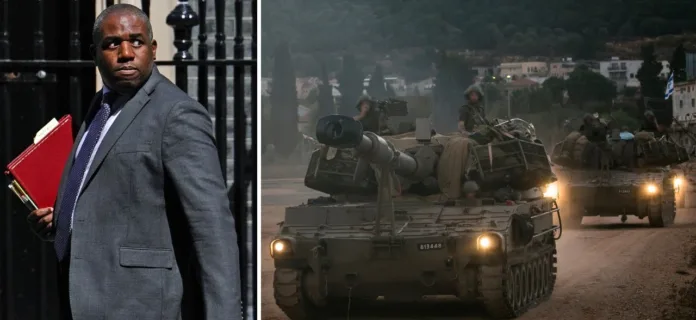Britain halts a portion of its arms export licences to Israel, reflecting growing scrutiny over military support in the ongoing Israeli-Palestinian conflict
On September 2, 2024, the United Kingdom announced the suspension of 30 out of its 350 arms export licences to Israel, amid escalating concerns over the use of British-supplied military equipment in the ongoing Israeli-Palestinian conflict. The decision marks a significant shift in the UK’s arms export policy and highlights the increasing scrutiny over military support provided to the Israeli government.
The move was confirmed by Britain’s Foreign Secretary, David Lammy, following a cabinet meeting in London. This suspension affects licences that permitted the export of various military goods, including equipment that could be used in military operations or conflict zones.
The suspension comes after rising international criticism and calls for more stringent controls on arms sales to countries involved in conflicts. Recent reports have raised concerns about the potential misuse of exported military equipment in conflicts, leading to increased pressure on the UK government to reassess its arms export policies.
The UK government’s decision is a response to the intensifying conflict between Israel and Palestine, with critics arguing that arms supplied by Britain may contribute to the ongoing violence and civilian suffering. The suspension of these licences reflects the UK’s attempt to balance its foreign policy objectives with international humanitarian concerns.
David Lammy emphasized that the suspension of these licences is a precautionary measure while the UK reviews its arms export policies. “We are committed to ensuring that our military exports do not contribute to conflict or human rights abuses,” Lammy stated. “The review will be thorough and aim to address any concerns regarding the use of British-supplied arms.”
The UK’s decision to suspend a portion of its arms export licences follows similar actions by other European countries, which have faced mounting pressure to restrict arms sales to conflict zones. The move is part of a broader trend among Western nations to reassess their military export policies in light of international humanitarian standards.
The suspension of the arms licences will have implications for British defence contractors and the wider arms industry, which relies on international sales for a significant portion of its revenue. While the immediate impact on the industry is uncertain, the decision underscores the growing emphasis on ethical considerations in arms exports.
The UK government has assured that it will continue to support Israel through other means, including diplomatic and humanitarian aid. However, the suspension of these licences marks a notable shift in the UK’s approach to arms exports and its role in the Israeli-Palestinian conflict.
As the situation continues to evolve, the UK’s decision is likely to be closely monitored by international observers and could influence arms export policies in other countries involved in similar conflicts. The review process will be critical in determining the future of the UK’s arms export policy and its alignment with international humanitarian standards.
Analysis:
Political: The suspension of arms export licences to Israel is a politically charged decision with significant ramifications. It reflects the UK’s attempt to navigate the complex dynamics of international relations while responding to domestic and global calls for a more ethical approach to arms exports. This move could strain relations with Israel and impact the UK’s standing in the region. Additionally, it underscores the growing influence of humanitarian considerations in shaping foreign policy and defence strategies.
Social: The decision to suspend arms exports highlights the growing public and political concern over the ethical implications of military support in conflict zones. It reflects broader societal debates about the role of arms exports in global conflicts and the responsibility of nations to prevent human rights abuses. The suspension may resonate with advocacy groups and citizens who have called for more stringent controls on military sales and a reevaluation of the UK’s role in international conflicts.
Racial: The suspension of arms licences does not directly address racial issues, but it intersects with broader discussions about the impact of arms sales on diverse communities affected by conflict. The use of military equipment in conflicts can have disproportionate effects on various demographic groups, including ethnic and racial minorities. The UK’s decision reflects a broader awareness of the need to consider the human impact of arms exports on affected populations.
Gender: Similar to racial considerations, gender issues are not directly addressed by the suspension of arms licences. However, conflicts involving the use of military equipment can have significant gendered impacts, with women and girls often disproportionately affected by violence and displacement. The decision to suspend licences aligns with a broader recognition of the need to consider the gendered dimensions of conflict and the impact of military support on vulnerable populations.
Economic: The suspension of arms export licences will have economic implications for British defence contractors and the broader arms industry. The loss of licences could affect revenue streams for companies involved in the production and export of military equipment. Additionally, the decision may influence future arms export policies and contract negotiations, as the UK seeks to balance ethical considerations with economic interests.
